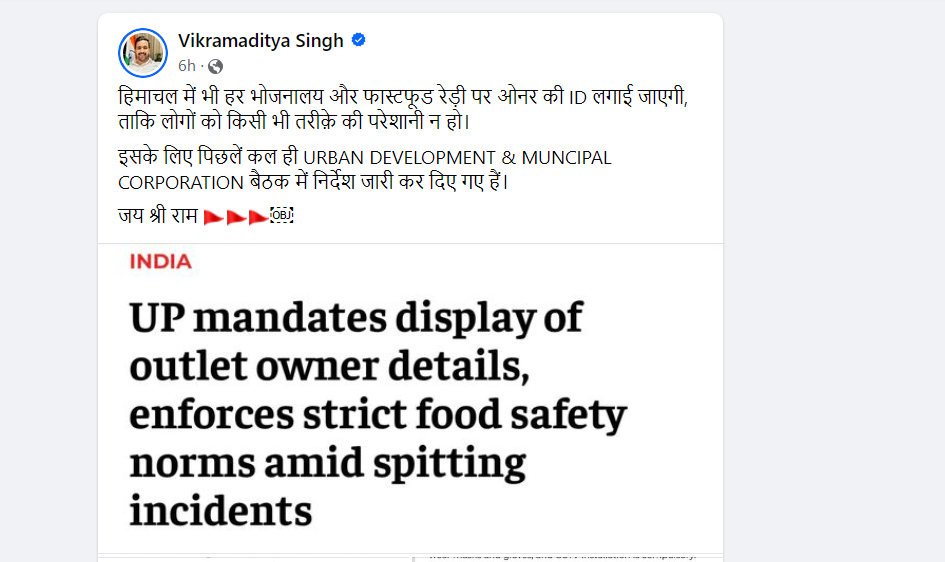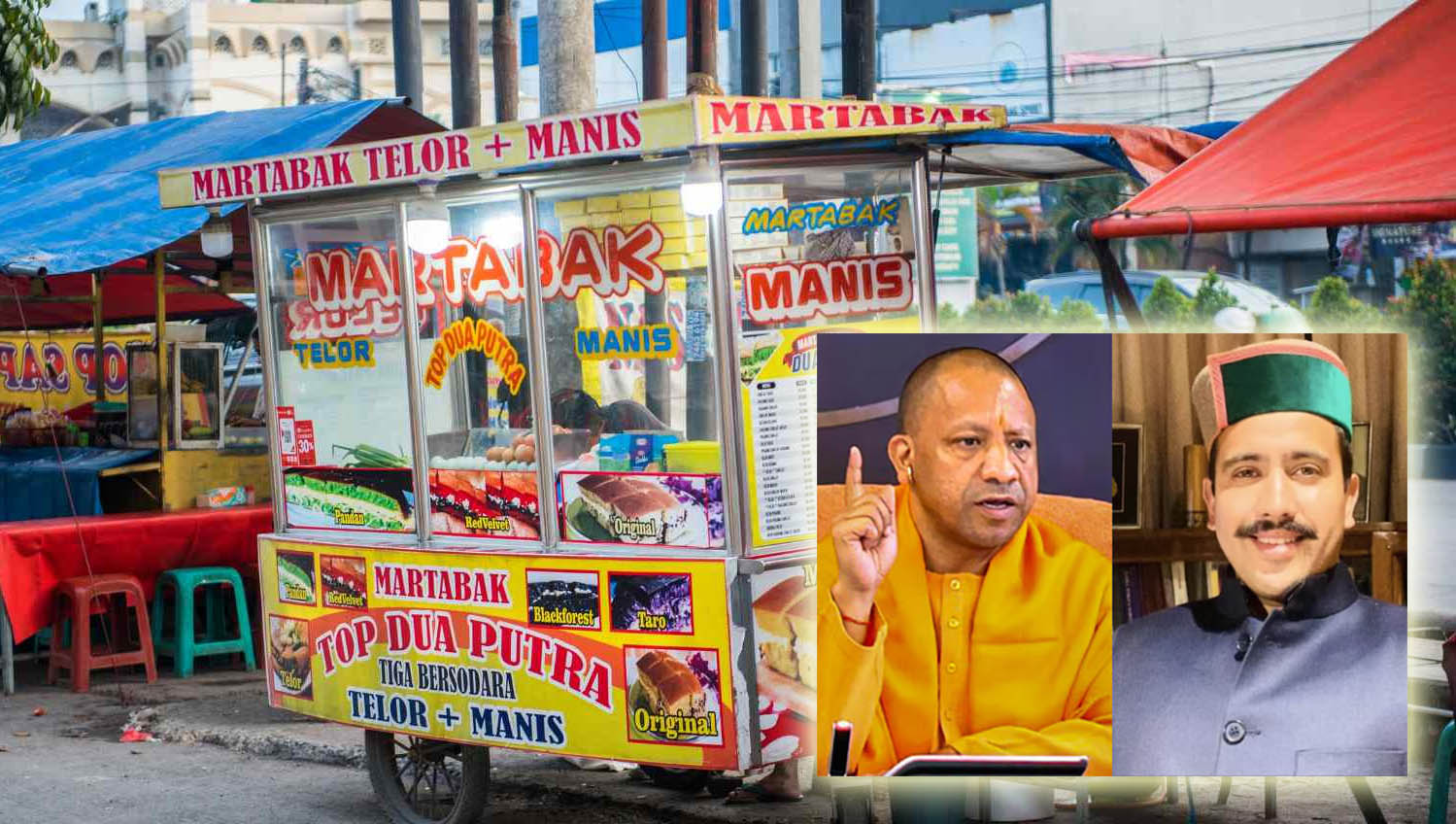Update:
On September 26, a day after state minister, Vikramaditya Singh’s announcement regarding the identification rule for eateries, the Himachal Pradesh government distanced itself from his remarks, clarifying that the State Cabinet had yet to take a formal decision on the matter.
🔴 #NewsAlert | Himachal Pradesh Government distances itself from MLA #VikramadityaSingh over eateries’ ID rule. This comes after he proposed an Uttar Pradesh-like model for Himachal.
The government says, “Cabinet still to take a decision.”
— NDTV (@ndtv) September 26, 2024
This move came in response to widespread backlash against the Congress-led Himachal government for seemingly aligning with the BJP-led Uttar Pradesh government’s divisive and discriminatory policies. However, it is important to note that while the government has distanced itself from Singh’s comments, it has yet to offer a clear explanation as to why such contentious policies are even under consideration.
On September 25, the Congress-led Himachal Pradesh government mandated all food vendors and eateries in the state to display the names and addresses of their owners, aiming to increase ‘transparency’ for customers. This decision was announced by Himachal Pradesh Assembly Speaker Kuldeep Singh Pathania in a Facebook post following a meeting of the state’s Urban Development and Municipal Corporation on Tuesday.
Pathania stated, “In Himachal, all restaurants and fast-food outlets will now be required to display the owner’s identification to ensure convenience for customers. Instructions for this were issued during yesterday’s Urban Development and Municipal Corporation meeting.”
To ensure proper implementation, a seven-member committee has been formed, including ministers Vikramaditya Singh and Anirudh Singh, according to the New Indian Express. Additionally, new regulations for hawkers will be introduced, requiring them to obtain identity cards.
Framed as a move to ensure transparency and protect public health, this decision mirrors a similar directive by the Bharatiya Janata Party- led Uttar Pradesh government aimed at curbing food adulteration and ensuring accountability in the food industry. However, these initiatives have once again triggered fears of selective profiling and targeting of marginalised groups, particularly Muslim and Dalit vendors, raising concerns about the potential misuse of these regulations under the pretext of hygiene enforcement.
The trigger: Incidents of food adulteration in Uttar Pradesh
In Uttar Pradesh, the directive was released on September 24, on the heels of multiple shocking incidents of food contamination, including viral videos showing individuals spitting on food and mixing urine into beverages. Chief Minister Yogi Adityanath expressed outrage at these acts, calling them not only “disgusting” but also a severe threat to public health. In response, he ordered that all food establishments—ranging from dhabas and small eateries to restaurants—display the names and addresses of operators, proprietors, and managers to ensure accountability and transparency.
Similarly, Himachal Pradesh Urban Development Minister Vikramaditya Singh announced on social media that every restaurant and fast-food outlet in the state would be required to display the owner’s identification. “This will ensure that the public faces no difficulties and will also enhance accountability,” Singh stated.

The hidden impact: Fear of profiling and targeting marginalised vendors
Despite the stated intent of these mandates, there is growing unease about how these measures could disproportionately affect Muslim and Dalit vendors. Many fear that, under the guise of enforcing hygiene standards, these regulations could become a tool for selective profiling and targeting of individuals from these vulnerable communities.
Street food vendors and small eatery owners in both Uttar Pradesh and Himachal Pradesh are often from marginalised backgrounds. In Uttar Pradesh, many vendors—especially Muslims and Dalits—already face suspicion and social stigma. There are rising fears that the mandatory display of their names and addresses could expose them to harassment, either from local authorities or communal vigilante groups. Such concerns are not unfounded. In recent years, both Muslim and Dalit communities have faced increasing hostility and targeted violence, often exacerbated by inflammatory speeches from political leaders.
In light of these realities, the directive is seen by many as potentially discriminatory, using public health as a cover for deep-seated biases. Muslim vendors in particular, who have often been accused of food contamination in communal rhetoric, may be disproportionately scrutinised, resulting in economic and social marginalisation.
CCTV and employee verification: additional security measures or additional risks?
In Uttar Pradesh, the government’s response has extended beyond name displays. CM Yogi Adityanath has also directed the installation of CCTV cameras at all food establishments, ensuring that surveillance covers not only dining areas but also food preparation zones. As per the direction, operators must ensure the security of this footage, and it must be made available to the police or local administration upon request.
In addition, a state-wide employee verification campaign has been launched. Teams from the Food Safety and Drug Administration, Police, and Local Administration are tasked with verifying the legitimacy of all workers at food establishments. On paper, this initiative is aimed at strengthening public safety, but activists argue it could serve as yet another avenue for selective targeting, particularly of Muslim and Dalit workers.
The verification process could further entrench biases against these communities, many of whom work informally in the food sector. Given the history of police discrimination against Dalits and Muslims, there are fears that the verification process could result in harassment or exclusion of workers from these communities. This could threaten their livelihoods, particularly in states like Uttar Pradesh, where communal tensions are high.
The Supreme Court’s intervention: a temporary reprieve?
The Uttar Pradesh government’s recent mandates follow a controversial order issued by the authorities in Uttar Pradesh and Uttarakhand earlier this year, requiring food sellers along the Kanwar Yatra route to display their names, addresses, and phone numbers. The Supreme Court intervened, issuing a stay on the enforcement of the order on July 22, 2024. The court ruled that while food sellers could be required to display the type of food they were selling, they should not be forced to reveal personal details about the owners or staff. The court also noted that such directives could lead to undue harassment, particularly in a climate of rising communal tensions. (Detailed report may be read here)
Despite this temporary stay, concerns remain about how these mandates will be implemented across the states, particularly in regions with a history of discrimination against marginalised communities. Activists have pointed out that even if the Supreme Court’s interim order stands, local authorities might continue to use the disguise of hygiene issues to selectively target Muslim and Dalit vendors under the pretext of enforcing health and safety standards.
Public health or discrimination?
While the need to address public health issues and food safety is undeniable, the enforcement of these mandates raises the question of whether hygiene concerns are being used to further marginalise specific communities. Muslim and Dalit vendors, who already face societal and economic challenges, may now be subject to increased scrutiny, harassment, or even forced closure of their businesses under the pretext of hygiene violations.
There are justifiable fears in the country at the moment through which is it argued that without adequate safeguards, the Himachal Pradesh and Uttar Pradesh directives could lead to a rise in communal and caste-based discrimination. The visible display of Muslim or Dalit names in a highly polarised environment may encourage communal vigilantism, threatening the safety and livelihoods of these vendors.
Furthermore, the requirement for CCTV installations and the employee verification campaign, while ostensibly aimed at improving food safety, could disproportionately impact marginalised vendors by adding bureaucratic hurdles that are difficult for small, informal establishments to navigate. This could push many out of business, further deepening economic inequalities.
As governments push forward with their mandates, it is essential to strike a balance between ensuring food safety and protecting the rights of marginalised communities. The focus should not only be on hygiene but also on safeguarding the dignity and livelihoods of vendors, particularly those from Muslim and Dalit backgrounds, who are at risk of being unfairly targeted. Without careful implementation and strong legal safeguards, these regulations could become yet another tool for discrimination in an already fraught socio-political climate.
Related:
